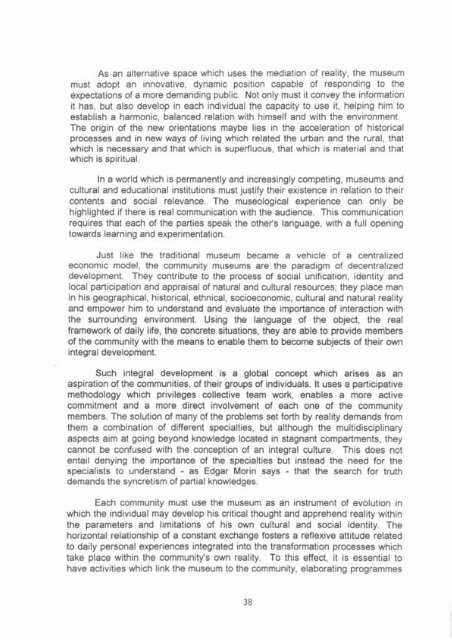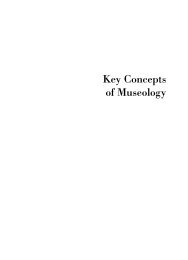ISS 25 (1995).pdf - The International Council of Museums
ISS 25 (1995).pdf - The International Council of Museums
ISS 25 (1995).pdf - The International Council of Museums
Create successful ePaper yourself
Turn your PDF publications into a flip-book with our unique Google optimized e-Paper software.
As an alternative space which uses the mediation <strong>of</strong> real ity, the museum<br />
must adopt an innovative, dynamic position capable <strong>of</strong> respond ing to the<br />
expectations <strong>of</strong> a more demanding public. Not only must it convey the information<br />
it has, but also develop in each individual the capacity to use it, helping him to<br />
establish a harmonic, balanced relation with himself and with the environment.<br />
<strong>The</strong> origin <strong>of</strong> the new orientations maybe lies in the acceleration <strong>of</strong> historical<br />
processes and in new ways <strong>of</strong> living which related the urban and the rural , that<br />
which is necessary and that which is superfluous, that which is material and that<br />
which is spiritual.<br />
In a world which is permanently and increasingly competing, museums and<br />
cultural and educational institutions must justify their existence in relation to their<br />
contents and social relevance. <strong>The</strong> museological experience can only be<br />
highlighted if there is real communication with the audience. This communication<br />
requires that each <strong>of</strong> the parties speak the other's language, with a full opening<br />
towards learning and experimentation.<br />
Just like the traditional museum became a vehicle <strong>of</strong> a centralized<br />
economic model, the community museums are the paradigm <strong>of</strong> decentralized<br />
development. <strong>The</strong>y contribute to the process <strong>of</strong> social unification, identity and<br />
local participation and appraisal <strong>of</strong> natural and cultural resources; they place man<br />
in his geographical , historical, ethnical, socioeconomic, cultural and natural reality<br />
and empower him to understand and evaluate the importance <strong>of</strong> interaction with<br />
the surrounding environment. Using the language <strong>of</strong> the object, the real<br />
framework <strong>of</strong> daily life, the concrete situations, they are able to provide members<br />
<strong>of</strong> the community with the means to enable them to become subjects <strong>of</strong> their own<br />
integral development.<br />
Such integral development is a global concept which arises as an<br />
aspiration <strong>of</strong> the communities, <strong>of</strong> their groups <strong>of</strong> individuals. It uses a participative<br />
methodology which privileges collective team work, enables a more active<br />
commitment and a more direct involvement <strong>of</strong> each one <strong>of</strong> the community<br />
members. <strong>The</strong> solution <strong>of</strong> many <strong>of</strong> the problems set forth by reality demands from<br />
them a combination <strong>of</strong> different specialties, but although the multidisciplinary<br />
aspects aim at going beyond knowledge located in stagnant compartments, they<br />
cannot be confused with the conception <strong>of</strong> an integral culture. This does not<br />
entail denying the importance <strong>of</strong> the specialties but instead the need for the<br />
specialists to understand - as Edgar Morin says - that the search for truth<br />
demands the syncretism <strong>of</strong> partial knowledges.<br />
Each community must use the museum as an instrument <strong>of</strong> evolution in<br />
which the individual may develop his critical thought and apprehend reality within<br />
the parameters and limitations <strong>of</strong> his own cultural and social identity. <strong>The</strong><br />
horizontal relationship <strong>of</strong> a constant exchange fosters a reflexive attitude related<br />
to daily personal experiences integrated into the transformation processes which<br />
take place within the community's own reality. To this effect, it is essential to<br />
have activities which link the museum to the community, elaborating programmes<br />
38
















